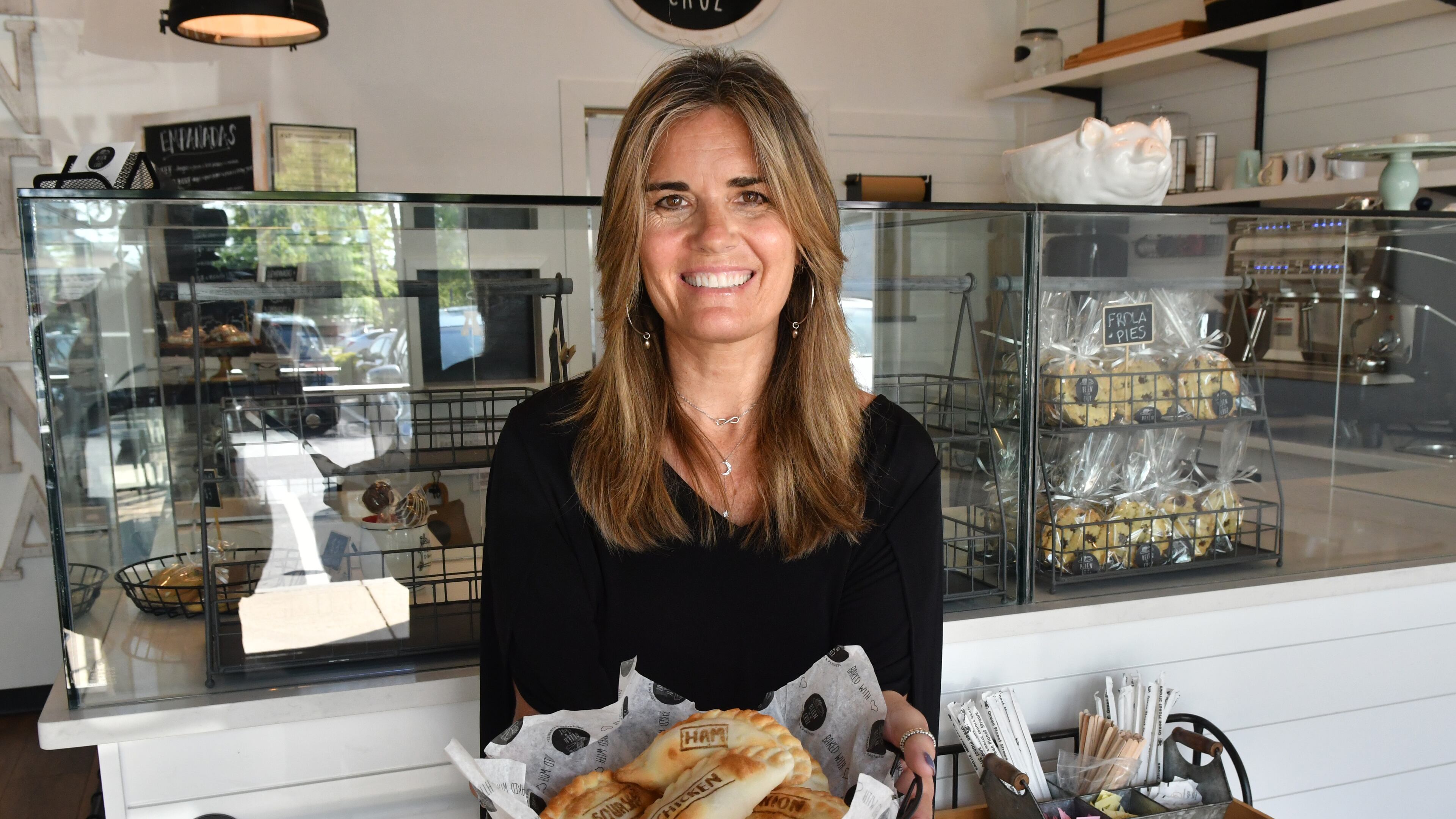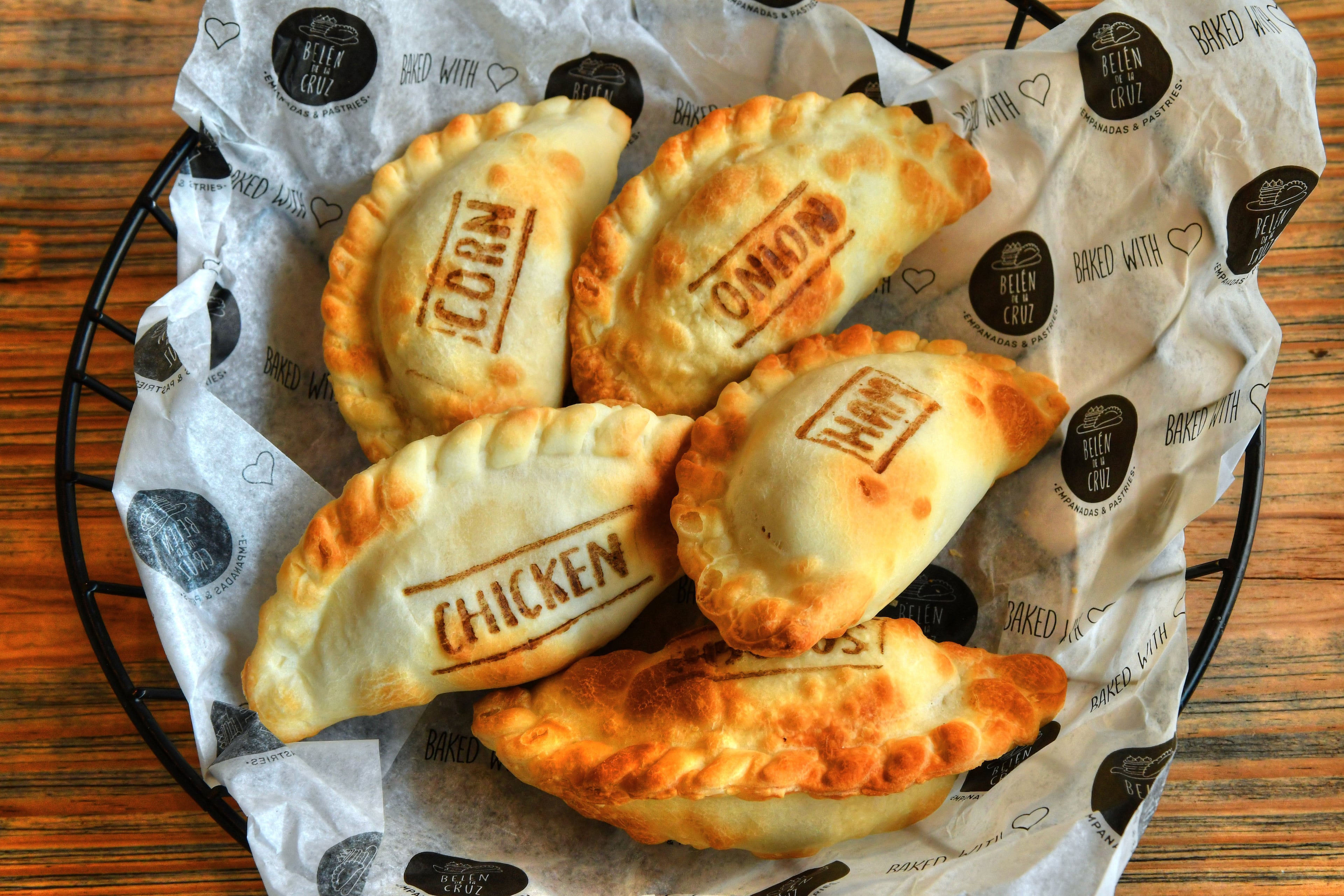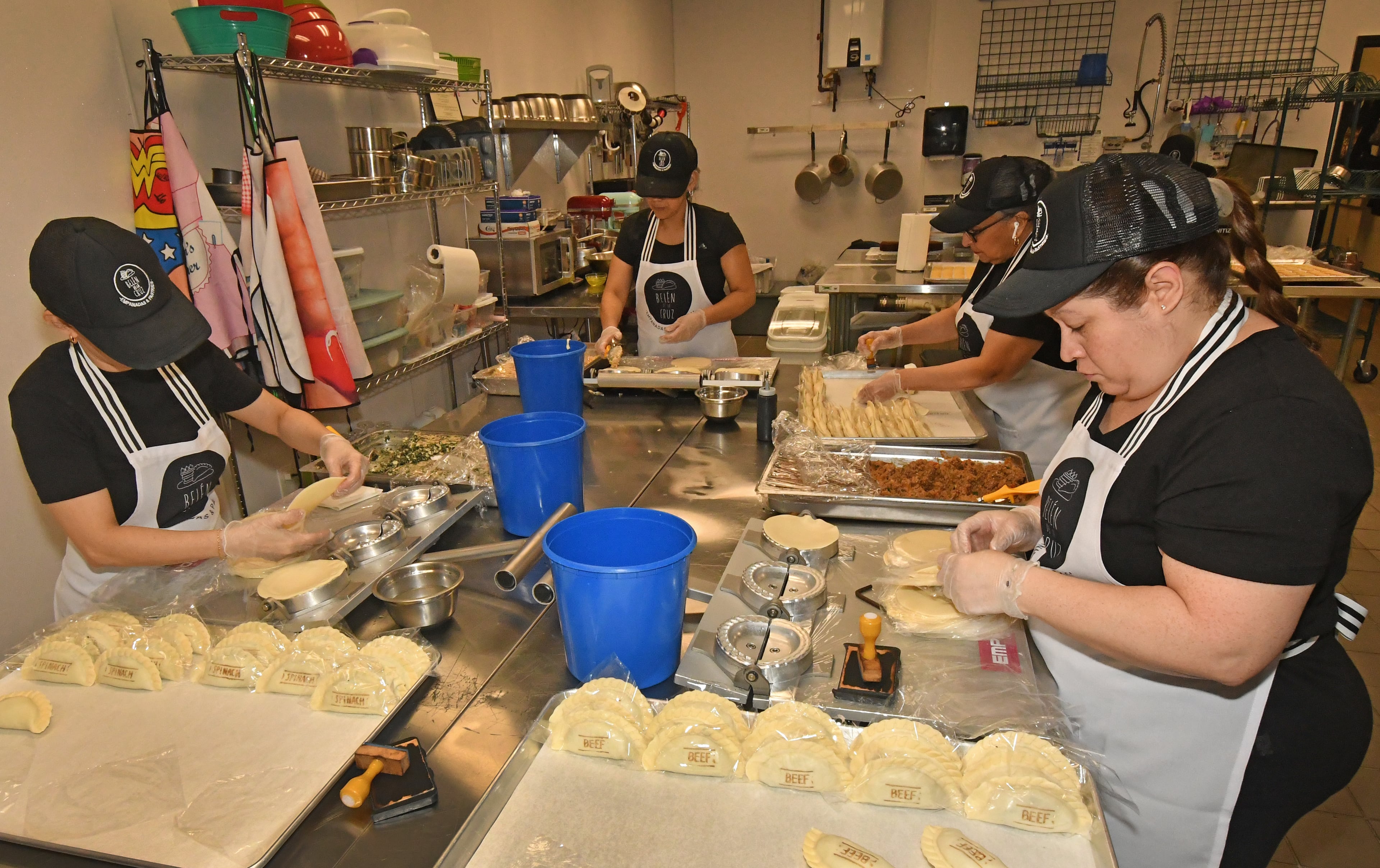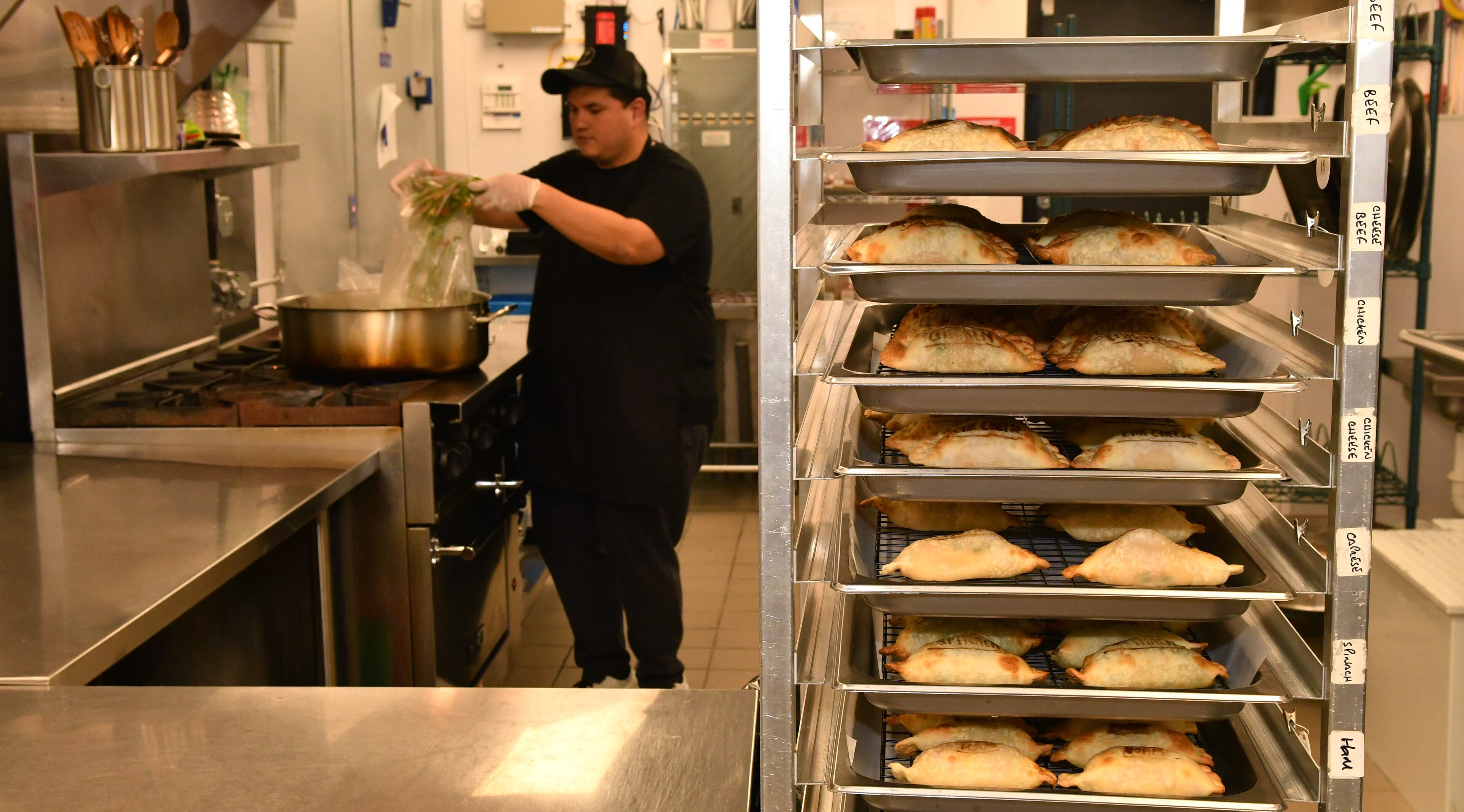Belén de la Cruz puts plenty of passion into her empanadas

Belén de la Cruz will never forget her first day of business selling Argentine-style empanadas from a shop bearing her name in Johns Creek.
It was a snowy Friday in February 2020. Her husband Fernando Stengel was there, along with their three children, Benjamin, Indy and Matheus, now ages 18, 16 and 14. She expected to sell 50, maybe 100 empanadas. By the time she closed the store, she’d sold 500.
The following Tuesday, however, her exhilaration had turned to dread. Fernando was back at his consulting job. The kids were at school. She was utterly alone with her new business.
“It was overwhelming,” recalled Belén. “I was crying. I had no idea what I was getting into.”
It didn’t help that a pandemic ensued just a few weeks later, or that she juggled teaching a staff of three to bake the pastries while managing the register because no one else spoke English.
Two years later, Belén de la Cruz Empanadas & Pastries employs 20 people between the flagship store where production occurs, and locations in Marietta and Chattahoochee Food Works in West Midtown. Empanada production for 13 flavor combinations is at 30,000 a month and soon to vastly increase with the recent purchases of a semi-automatic empanada folding machine and a walk-in freezer.

How did a person with no formal culinary training or food-service experience grow a business so quickly?
There have been happenstance encounters and lucky breaks, but Belén de la Cruz’s success is due mainly to sheer determination, thinking outside the box and an Argentine spirit of overcoming adversity that she calls “la viveza criolla,” or “Creole cleverness.”
“So many nights, I went to bed (saying): I’m done,” said Belén, who turns 50 in July. “In the morning, I wake up like a lion.”
Tapping an untapped market
Belén would be the first person to tell you that her journey as an entrepreneur has been circuitous and unscripted.
Born in Buenos Aires, she moved to Florida at age 17 and studied marketing at the University of California-Santa Barbara, then spent 15 years in a marketing position with Burger King. Marriage to Stengel, a former executive for Coca-Cola, meant moves to Brazil (twice), Mexico and Argentina. By the time the family of five relocated to Atlanta in 2015, the then stay-at-home mother was itching for her own project. That happened in 2018 by way of a cooking class she gave to an Argentine friend. One class led to another, with attendees devouring her empanadas and wondering where they could purchase them.
Seeing an untapped market, and with the encouragement of her brother Sebastian in Argentina, she sought to move from cottage business to a brick-and-mortar, settling on a space in Johns Creek that was previously occupied by a bike shop.
She applied her background in marketing and eye for design but “I had no idea about the health department or licenses. I didn’t know how to run a restaurant.”

But she wasn’t afraid to ask for help. Like when she tapped food distributor friend Jason Morgan to connect her with Steven Hartsock, owner of Socks’ Love Barbecue, who let her tour his Cumming restaurant to get a sense of kitchen design.
“At the time, I thought, Oh, my God. There is no way she is going to make it,” recalled Hartsock. “(She had) no industry background.”
He was honest with her about his experience and gave her some logistics about how he laid out his store. And his skepticism was quickly proved unfounded.
“I underestimated her passion and the quality of her product,” he said.
Argentine empanada ambassador
Although Belén favors kitchen creativity over constrictive recipes, she knew that she’d need to standardize.
Her empanada recipes cull elements of those made by her mother and grandmother, as well as the great teacher named Google.
In December 2019, just a few months before opening, she sought help from Argentine friend Chef Adrian Gerboles. For five days, he paused his job running culinary operations at a Hilton in Mexico City and flew to Atlanta to get the recipes from Belén’s brain into an organized binder.
Belén remains mindful of Argentine customs surrounding empanadas.
“Having a dry beef empanada, for us, is failing,” she said. “I’d rather have someone say it’s too juicy.”
What distinguishes Argentine hot pockets is that they are baked, never fried. They are made with flour, never cornmeal. The density of the dough is thin. And the size is typically 3-4 inches, although hers measure around 5. They are considered a healthy meal, not a fast-food snack. And the way in which an Argentine empanada is folded and sealed denotes the filling inside. At her shop, however, the filling name is stamped onto the baked dough for easy recognition and elegant branding.
The results were a hit from the start.

“It made me feel like I was at home,” said Ursula Eyherabide, Argentina’s deputy consul general in Atlanta, about Belén’s empanadas. They are now a staple at meetings when the diplomatic office wants to showcase Argentine fare to guests.
Word of mouth about Belén’s juicy, baked empanadas helped land her first wholesale account with Pop’s Coffee Co. in Roswell, which orders 300-400 empanadas a week.
“You could taste the freshness,” said Aaron McDaniel, Pop’s general manager.
Resourcefulness and resolve
When recent supply chain disruptions prevented her from receiving the dough she needed to make her empanadas, Belén drove to Miami to get it herself.
“You have to adjust,” she said. “In Argentina, we’re surviving all the time.”
Belén shares that quality with other Argentine entrepreneurs in Atlanta, said Eyherabide.

That ability to solve problems has paid off. And Belén recently formed a partnership with Cubanos ATL owner Ozzy Llanes. Soon, his popular Cuban sandwiches will be sold at her Marietta shop, and, if all goes well, her empanadas and pastries will be sold at his Cumming outpost.
Unfortunately, the need to solve problems never ends. Belén’s forearms bear burn marks, signs of her recent return to the kitchen to fill a staffing gap. The semi-automatic folding machine remains on backorder. But its ability to fold 1,000 empanadas an hour will ease the load from her kitchen staff — mostly Venezuelans who were professionals in their home country before seeking asylum in the U.S. — so they can gain other work skills, she said.
“People say this is the American dream, but it’s been very hard,” admitted Belén. Yet “la viveza criolla” courses through her veins. “There is passion with what we are doing. It’s totally gratifying.”
Belén de la Cruz Empanadas & Pastries. 11730 Jones Bridge Road, Johns Creek, 470-359-2976; 1050 E. Piedmont Road, Marietta, 678-540-8145; and Chattahoochee Food Works, 1235 Chattahoochee Ave. NW, Atlanta, no phone. belendelacruz.com.
Find more stories about metro Atlanta culinarians at ajc.com/culinary-journeys


